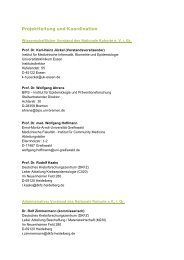Scientific Concept of the National Cohort (status ... - Nationale Kohorte
Scientific Concept of the National Cohort (status ... - Nationale Kohorte
Scientific Concept of the National Cohort (status ... - Nationale Kohorte
You also want an ePaper? Increase the reach of your titles
YUMPU automatically turns print PDFs into web optimized ePapers that Google loves.
C.1<br />
C.1 Annex: Description <strong>of</strong> <strong>the</strong> study centers<br />
Description <strong>of</strong> <strong>the</strong> institution responsible for establishing and operating <strong>of</strong> <strong>the</strong> study<br />
center<br />
regensburg university was founded in 1962 and was designed as a comprehensive university<br />
<strong>of</strong>fering a diverse spectrum <strong>of</strong> educational and research disciplines. An average<br />
<strong>of</strong> 20,000 students are currently enrolled at Regensburg University. The department <strong>of</strong><br />
Epidemiology and Preventive medicine at Regensburg University is embedded in <strong>the</strong><br />
Regensburg University Medical Center, a tertiary care facility that provides inpatient and<br />
outpatient diagnostics and <strong>the</strong>rapy for all serious diseases. It accommodates 20 clinical<br />
departments and five biomedical institutes and provides <strong>the</strong> majority <strong>of</strong> health care in North-<br />
Eastern Bavaria, with 29,000 inpatients and 111,000 outpatients being treated here every<br />
year. The Faculty <strong>of</strong> Medicine at Regensburg University Medical Center has made a firm<br />
commitment to support a comprehensive research program on disease prevention. As such,<br />
<strong>the</strong>re are strong research collaborations between <strong>the</strong> epidemiology department and clinical<br />
partners at <strong>the</strong> Regensburg University Medical Center, including collaborations in <strong>the</strong> areas<br />
<strong>of</strong> cardiovascular and metabolic diseases, cancer, neurodegenerative diseases, and biostatistics.<br />
Clinical research infrastructure is available at <strong>the</strong> Regensburg University Medical<br />
Center for all pertinent aspects <strong>of</strong> medical and epidemiologic data collection and analysis,<br />
including experienced study personnel (study nurses, data managers, IT specialists, and<br />
quality assurance managers), laboratory facilities for blood sampling and biospecimen storage,<br />
and in-house facilities for imaging examinations (MRI).<br />
The primary areas <strong>of</strong> research <strong>of</strong> <strong>the</strong> Department <strong>of</strong> Epidemiology and Preventive Medicine<br />
at Regensburg University include <strong>the</strong> interrelationship between body size, energy intake,<br />
physical activity, and chronic disease with a focus on cancer. Research encompasses methodological<br />
research on <strong>the</strong> assessment <strong>of</strong> physical activity and its individual components.<br />
Although physical activity measurement techniques have evolved considerably over <strong>the</strong><br />
past few years, <strong>the</strong> main obstacle in quantifying physical activity is <strong>the</strong> complexity <strong>of</strong> precisely<br />
measuring its individual components. In addition, <strong>the</strong> department is pursuing research<br />
to identify <strong>of</strong> biological mechanisms linking <strong>the</strong> adverse effects <strong>of</strong> obesity, energy oversupply,<br />
and physical inactivity to disease risk. Possible biological mechanisms include insulin<br />
resistance and lipid metabolism, insulin-like growth factors, steroid hormones, immune function,<br />
and inflammatory factors. The department also has a strong focus on molecular and<br />
genetic epidemiology and it is an active participant <strong>of</strong> several large consortia, such as GI-<br />
ANT (Genetic Investigation <strong>of</strong> ANThropometric parameters), one <strong>of</strong> <strong>the</strong> largest international<br />
genetic epidemiology consortia including over 40 studies involving n~120,000 subjects and<br />
n~100 researchers. In addition to research, <strong>the</strong> department provides teaches epidemiology<br />
to medical students and students <strong>of</strong> molecular medicine through lectures, seminars, and<br />
mentorships for masters, and doctoral <strong>the</strong>ses.<br />
Description <strong>of</strong> <strong>the</strong> study center Regensburg<br />
The sampling frame for <strong>the</strong> <strong>National</strong> <strong>Cohort</strong> includes a source population <strong>of</strong> 215,000 inhabitants<br />
in Regensburg city and neighboring communities. Under <strong>the</strong> leadership <strong>of</strong> M.<br />
Leitzmann 10,000 study participants in <strong>the</strong> age range <strong>of</strong> 20 - 69 years will be recruited at<br />
<strong>the</strong> study center in Regensburg. The study center includes ample space (approximately 500<br />
m²) for interviews, clinical investigations, blood draws, and interim storage <strong>of</strong> biosamples.<br />
The study center is located within <strong>the</strong> Regensburg University Medical Center, which is easily<br />
accessible to study participants via public transportation or by car. The direct location <strong>of</strong><br />
<strong>the</strong> study center at Regensburg University Medical Center and its existing collaborations<br />
with numerous clinicians and associated scientists will allow for an optimal conduct and<br />
oversight <strong>of</strong> <strong>the</strong> study operations and will facilitate identifying and validating a wide range<br />
230



